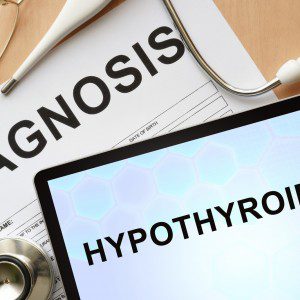
Hypothyroid or Underactive Thyroid
What is hypothyroidism?
Hypothyroidism is a condition in which your body lacks sufficient thyroid hormone. Often our naturopathic doctor will see clients who have had their thyroid hormones tested with “normal” results, but they are exhibiting many, if not all, of the symptoms of an underactive thyroid. This is referred to as subclinical hypothyroidism and responds very well to naturopathic treatment.
What Causes Hypothyroid?
- The most common reason for an underactive thyroid is a condition known as Hashimoto’s or Hashimoto’s thyroiditis. It is an autoimmune disorder where your body attacks your own thyroid and destroys the tissue. While this is happening, blood tests may be inconsistent and may even show normal levels of TSH, free T3 and free T4. Most patients, even those with obvious thyroid disease, have never been tested for Hashimoto’s. There are blood tests available for this that our naturopathic doctor will order. These blood tests check for anti-TPO antibodies and anti-thyroglobulin.
- Nutritional deficiencies. Your thyroid needs iodine, zinc, selenium, copper and tyrosine to do its job properly. A deficiency of any of these nutrients prevents your thyroid from working right.
- Poorly functioning endocrine system. All of the parts of your endocrine (hormone-producing) system work together. If one part isn’t working well, it negatively impacts the others.
What are the symptoms of hypothyroidism (underactive thyroid)?
- Fatigue
- Weakness
- Weight gain or difficulty losing weight
- Hair loss
- Muscle cramps and frequent muscle aches
- Depression
- Irritability
- Memory loss
- Abnormal menstrual cycles
- Infertility
Natural Treatment for Hypothyroidism
As a Naturopath, I always try to address and treat the underlying cause of the problem.
Several factors influence healthy thyroid function:
- nutrition and diet
- vitamin and mineral status
- stress
- liver and adrenal gland function and
- heavy metal (particularly mercury) toxicity.
My extensive intake procedure helps me determine whether diet changes, vitamins, herbs, liver support, endocrine system help, functional medicine testing, and/or acupuncture will be most appropriate for you. I can determine whether there are issues with your liver function, heavy metals, adrenal gland or HPA axis function, Hashimoto’s disease, and nutritional deficiencies.
Many of my clients have at least been able to reduce the dosage of their thyroid medications, avoid taking thyroid medication or enjoy better health and vitality by improving how well their body uses their existing medicines.
Thyroid Blood Tests
Thorough testing for your thyroid includes the following tests: TSH, free T3, free T4, reverse T3, anti-TPO, and anti-thyroglobulin antibodies. Even in Hashimoto’s disease, TSH, free T3, and free T4 numbers can all be normal. The range of what is considered normal for TSH is quite broad – 0.35-5.00. Many of my patients do not feel normal and exhibit many hypothyroid symptoms once their TSH level gets above 3.50. For my infertility patients, I require their TSH to be below 2.50. Our naturopathic doctor orders and interprets these lab tests for you and provides solutions that will get to the root of thyroid issues.
By Dr. Pamela Frank, Naturopathic Doctor, updated March 20, 2025
Hypothyroid and Natural Medicine Research
Vitamin A
Vitamin A may reduce the risk of subclinical hypothyroidism in premenopausal women. Source: J Am Coll Nutr. 2012 Aug;31(4):268-74.
Zinc
Zinc supplementation in addition to normal thyroxine treatment was found to improve symptoms of hypothyroidism. Source: International Journal of Trichology, January 2013
Curcumin
In a study involving hypothyroid rates, vitamin E and curcumin were found to regulate gene expression. Source: Mol Biol Rep; 2012 Jun 24
Calcium
Levothyroxine, also T4, is a synthetic form of the thyroid hormone. Calcium binds T4 in the acidic stomach which limits its bioavailability. Source: Complementary Prescriptions Journal, Vol.26, Issue 12, Dec. 2012
Selenium
Selenium supplementation may optimize thyroid hormone feedback at the pituitary level and decrease the stimulation of the residual thyroid tissue in infants, children, and adolescents. Source: Biofactors. 2003;19(3-4):137-43.